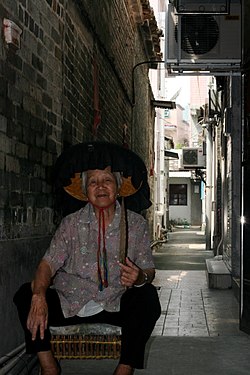Hakka culture

A Hakka woman wearing a traditional hat.
|
|
| Total population | |
|---|---|
| (estimated 80 million worldwide) | |
| Regions with significant populations | |
| Mainland China (Guangdong, Fujian, Jiangxi, Guangxi, Sichuan, Hunan, Zhejiang, Hainan, Guizhou), Hong Kong, Taiwan, Southeast Asia (Singapore, Malaysia, Indonesia, Thailand, Vietnam, Myanmar, Timor-Leste), South Asia (India, Nepal, Bangladesh), Oceania (Fiji, Australia, New Zealand), Africa (South Africa, Mauritius, Réunion, Kenya, Tanzania), North America (United States, Canada), Europe (United Kingdom, France, Netherlands), Caribbean (Cuba, Trinidad and Tobago, Guyana, Suriname, Jamaica), Central and South America (Mexico, Colombia, Panama, Brazil, Peru, Argentina) | |
| Languages | |
| Hakka Chinese + language(s) of their country of residence | |
| Religion | |
| Predominantly Chinese folk religions (Taoism, Confucianism, ancestral worship and others), Mahayana Buddhism, Christianity, non religious and others | |
| Related ethnic groups | |
| Other Han Chinese groups |
| Hakka people | |||||||||||||||||||||||||||||
| Chinese | 客家 | ||||||||||||||||||||||||||||
|---|---|---|---|---|---|---|---|---|---|---|---|---|---|---|---|---|---|---|---|---|---|---|---|---|---|---|---|---|---|
| Literal meaning | "Guest Families" | ||||||||||||||||||||||||||||
|
|||||||||||||||||||||||||||||
| Transcriptions | |
|---|---|
| Standard Mandarin | |
| Hanyu Pinyin | Kèjiā |
| Wade–Giles | Ko4-chia1 |
| IPA | [kʰɤ̂tɕjá] |
| Gan | |
| Romanization | Kak6 Ga1 |
| Hakka | |
| Romanization | Hag2-ga24 |
| Yue: Cantonese | |
| Yale Romanization | Haak-gāa |
| Jyutping | Haak3-gaa1 |
| Southern Min | |
| Tâi-lô | Kheh-ka |
The Hakkas (Chinese: 客家), sometimes Hakka Han, are Han Chinese people whose ancestral homes are chiefly from the Hakka-speaking provincial areas of Guangdong, Fujian, Jiangxi, Guangxi, Sichuan, Hunan, Zhejiang, Hainan and Guizhou. The Chinese characters for Hakka (客家) literally mean "guest families". Unlike other Han Chinese groups, the Hakkas are not named after a geographical region, e.g. a province, county or city. The Hakkas are usually identified with people who speak the Hakka language or share at least some Hakka ancestry.
The Hakkas are thought to have originated from the lands bordering the Yellow River (the modern northern Chinese provinces of Shanxi, Henan, and Hubei). In a series of migrations, the Hakkas moved and settled in their present areas in Southern China, and from there, substantial numbers migrated overseas to various countries throughout the world. As the most diasporic among the Chinese community groups, the worldwide population of Hakkas is about 80 million.
The Hakka people have had some influence on the course of modern Chinese and overseas Chinese history; in particular, they have been a source of many revolutionary, political and military leaders.
It is commonly held that the Hakkas are a subgroup of the Han Chinese that originated in Northern China. To trace their origins, three accepted theories so far have been brought forth among anthropologists, linguists, and historians:
The latter two theories are the most likely and are together supported by multiple scientific studies. Clyde Kiang stated that the Hakkas' origins may also be linked with the Han's ancient neighbors, the Dongyi and Xiongnu people. However, this is disputed by many scholars and Kiang's theories are considered to be controversial.
...
Wikipedia
